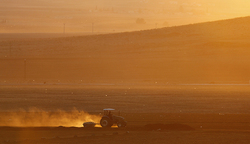
Al-Monitor | 8 July 2016
Turkey eyes African farmlands as own farmers go broke
Author Zülfikar Doğan
Translator Sibel Utku Bila
When Turkey's husbandry sector plunged into its first big crisis four years ago, the country imported thousands of sheep from France. The imports covered the meat shortage on the Turkish market and reined in the prices, while contributing to French farmers' prosperity. The agriculture minister at the time was awarded a medal of honor by the French government.
The problem, however, is not limited to husbandry. Once a leading country in agriculture, Turkey has seen growing shortages also in grain and pulse output, which are similarly covered with imports. Frustrated with the level of government support, hundreds of thousands of farmers have given up cultivating their fields and quit the sector. According to Ibrahim Yetkin, the head of the Turkish Agriculturists Association, millions of hectares of agricultural land has been lost, abandoned or left unused.
From 2003 to 2015, the Justice and Development Party (AKP) governments have spent 61 billion Turkish liras ($20 billion) on supporting agriculture and husbandry and 270 billion Turkish liras ($90 billion) on importing of agricultural products, according to Ozden Gungor, the chairman of the Turkish Chamber of Agricultural Engineers. Gungor said ill-advised policies have brought agriculture and husbandry to the point of collapse, with $17 billion spent on agricultural imports in 2015 alone.
The government has now announced plans to lease farmlands abroad as part of a broader package of economic measures. Deputy Prime Minister Nurettin Canikli said last month the measures would include also the import of 15,500 tons of meat. According to Agriculture Minister Faruk Celik, the government sees the lease of fertile land abroad as a priority and plans a comprehensive drive in this direction.
Ankara took its maiden step in this realm in 2013 when the Directorate-General of Agricultural Enterprises leased vast agricultural lands along the White Nile in Sudan for 99 years. The Turkish private sector, meanwhile, had acted long before the state. Leading companies such as Anadolu Holding, Cevahir Holding, Sutas Holding, Altinbas Holding and Boyhan Gida have been cultivating leased lands for years, driven by the inadequate support for farming at home. The products they grow in countries like Ethiopia, Madagascar, Mali, Mozambique, Romania, Macedonia, Argentina, the United States, Pakistan, Malaysia and Sudan range from corn, wheat and sunflower to walnut, pineapple, apricot and dates.
Yet, while vast arable lands remain unutilized at home, leasing farmlands abroad is a subject of criticism. The domestic shortages, critics say, can easily be overcome and even exceeded if the billions of dollars spent on importing agricultural products are allocated to support local producers, with the added benefit of contributing to exports. Now, however, Turkey will be using its foreign exchange both to lease lands abroad and to import the products cultivated there.
In remarks June 24, Ozden urged the government "to back its own farmers instead of leasing agricultural land abroad," stressing that 600,000 Turkish farmers had quit the sector in the past 12 years, bringing the number of officially registered farmers down to 2.2 million. The downturn in Turkish agriculture is the result of the government's "shallow and palliative policies," he said. "Forty-five percent of the European Union budget goes to agricultural support, while in Turkey the figure is only 2%."
Slamming also the "land grabs" in poor, hunger-stricken countries, Ozden said, "In African countries hit by deadly famines, millions of people are being driven from their lands, which are their only source of livelihood. The vacated lands are being leased to foreign companies and governments at very low prices, and the products cultivated there are being exported instead of being used to stamp out hunger in those countries. In Liberia, where 58% of the population is facing hunger, all agricultural lands are in foreign hands, while in Mozambique 29% of agricultural lands have been leased to foreigners." Citing figures by the World Trade Organization, Ozden said a total of 41 countries had leased agricultural land in 61 countries, most of them poor African nations.
Along with the decreased state support for farmers and the rising costs, the Turkish government's aggressive construction drive has also contributed to the decline in Turkish agriculture, as many arable tracts, water basins and pastures have been opened to construction. The criticism over the leasing plan forced the government to take a step toward protecting its own farmlands. Celik announced last month that 184 arable plains across Turkey would be designated protected areas off-limits to construction.












